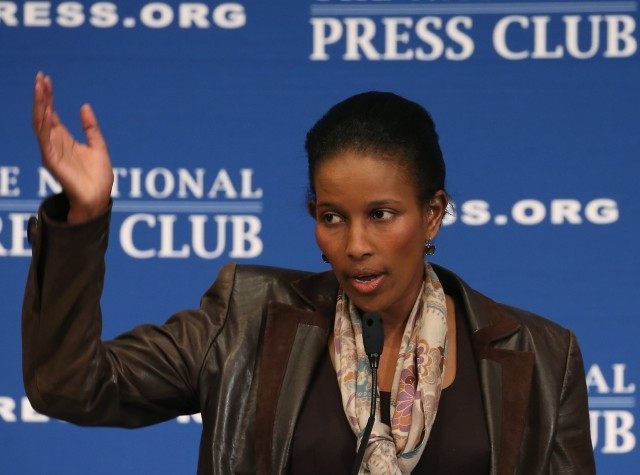A Somali-born former Muslim has said that the “Islamic cancer” currently spreading around the world must be cut out. Aayan Hirsi Ali, the author of three books, the latest of which argues for a Muslim reformation, praised the Prime Minister David Cameron for condemning Islamic extremism.
But in her enthusiasm for an Islamic reformation, she may be miss-interpreting Cameron’s words.
Writing in The Times, Hirsi Ali, who has previously called on Christians to convert Muslims to Christianity, said that, “with every passing year”, more and more of the world’s violent conflicts are due to violent Islam.
“Yet for more than a decade western leaders — conservatives and liberals alike — have united in insisting that ‘Islam is a religion of peace’ and buying the absurd notion that Islamophobia is the threat we should worry more about,” she said.
She praised Cameron for a speech he delivered last week in which he called Islamic extremism a doctrine “hostile to basic liberal values,” and rejected “the grievance justification” which aims to rationalise Islamic terrorism on the grounds that the West is out to destroy Islam.
“The reality in the world today is that the biggest persecutors of Muslims are the Islamists themselves. If you are a boy, as Mr Cameron said, Isis sees you as cannon fodder, and if you are a girl you are sexually abused to satisfy the lust of rulers of the so-called Caliphate,” she said.
“Why on earth could such a barbaric movement be attractive to young British Muslims, who have grown up with all the opportunities of a free society? No, it is not because they are somehow disenfranchised or impoverished. No, it is not somehow the fault of the security services. It is above all because young people are exposed to extremist ideas in mosques and Muslim centres as well as on the internet, while those in Muslim communities who argue for religious reform are intimidated into silence.”
Hirsi Ali’s latest book, Heretic, argues that there is no denying that some of the key teachings of Islam, such as the requirement to wage holy war, are inimical to liberal Western society. Her solution is for Islam to undergo a reformation similar to that of the Christian reformation of the 1500s. To that end she has identified five key doctrines that must be reformed in order to modernise Islam and make it compatible with 21st century life. “Islam is not a religion of peace,” she writes. For that reason, she says, Muslim reformers need our backing.
Her enthusiasm for her subject may have caused her to read more into Mr Cameron’s speech than is actually present. “The speech drew the now familiar distinction between Islamist extremism and Islam as a religion,” she writes. “But the reality, as he made clear, is that the former is derived from the latter. Koranic verses such as 9:5 and 9:29, which call for armed jihad, are deemed even by mainstream Islamic jurists to supersede more peaceful verses. Sahih Muslim, one of the six major authoritative hadith collections, claims that Muhammad undertook no fewer than 19 military expeditions, personally fighting in eight of them.”
However, Mr Cameron does not make this clear. Instead he said: “this extremist ideology is not true Islam,” and later referred to the “warped doctrine” of extremist Islam, which he compares to the “far right.”
Meanwhile, even supporters of Hirsi Ali have cast doubts on her plans for an Islamic reformation. In an article for the Weekly Standard earlier this year, Joseph Loconte, Associate Professor of History at the King’s College in New York City, wrote:
“Hirsi Ali’s understanding of the Protestant Reformation seems hampered by her secular lens: she fails to grasp how Martin Luther and the early reformers drew deeply on the Bible to defend the rights of conscience against coercion from church or state. This fact alone raises troubling questions about the ability of Islam to reform itself.”
The Islamic commentator Haroon Moghul has similarly dismissed Hirsi Ali’s plan on the grounds that it essentially seeks to strip Mohammed out of Islam: “Here are two of the five theses Ali believes are essential to her Reformation:” he writes.
“(a) Rejection of ‘the Prophet Muhammad’s semi-divine and infallible status along with the literalist reading of the Qur’an, particularly those parts that were revealed in Medina.’
“(b) Rejection of ‘Sharia, the body of legislation derived from the Qur’an.’
“Though not any kind of scholar of any kind of Islam, Hirsi Ali must know that no Muslim would accept these conditions. Not just because they’re anathema, but because they’re nonsensical.”

COMMENTS
Please let us know if you're having issues with commenting.